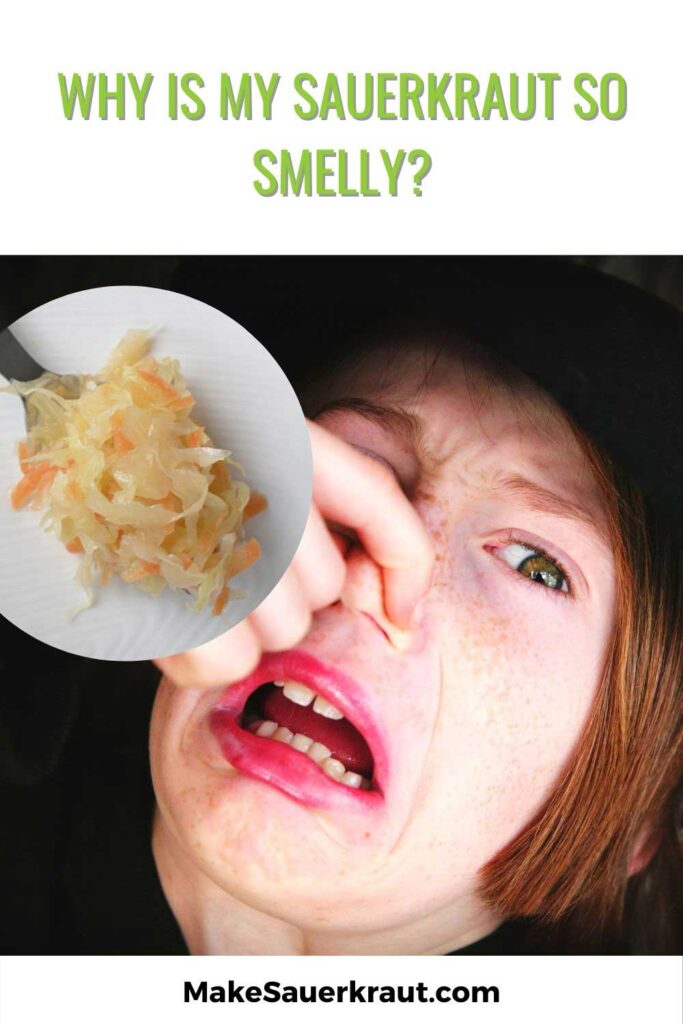Ever opened a jar of fermenting sauerkraut and been hit with a smell that reminds you of dirty diapers, rotten eggs, or stinky cheese? It’s a common issue, but don’t worry, you’re not alone.
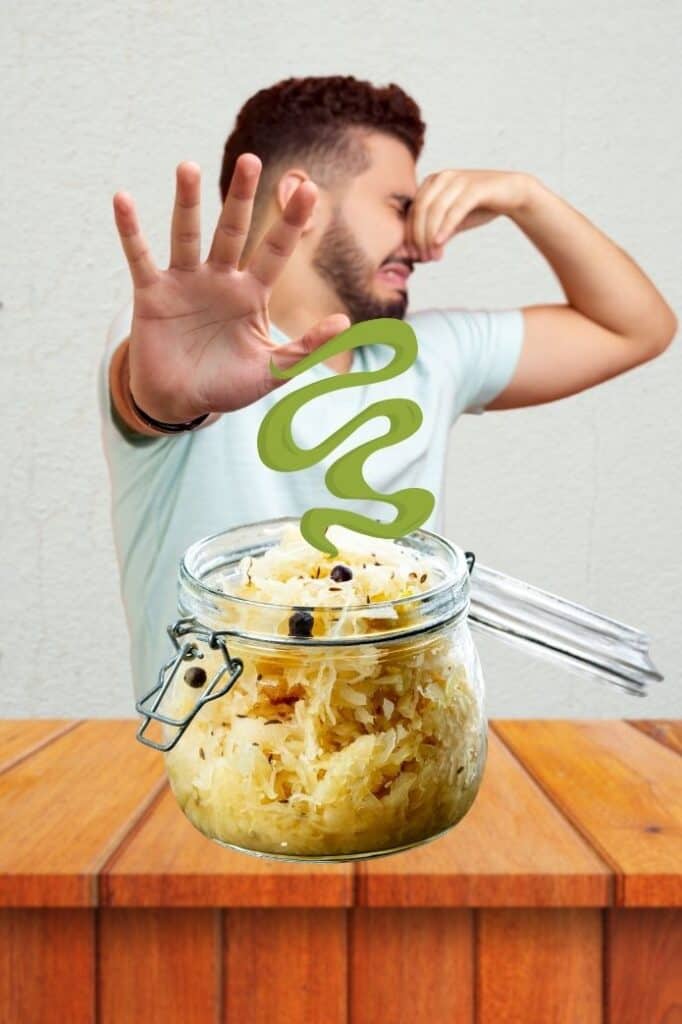
Fermenting sauerkraut can sometimes produce some pretty unpleasant smells.
Terms like dirty diapers, rotten eggs, and even gym sweat are often used to describe these noxious odors.
But why does this happen, and what can you do about it?
We’ll also differentiate between normal and pungent fermentation odors, providing tips on how to manage them and ensure your sauerkraut stays on track.
The hidden culprits
What exactly are we smelling?
Hydrogen sulfide!
The sulfur content of your cabbage is to blame.
Sulfur
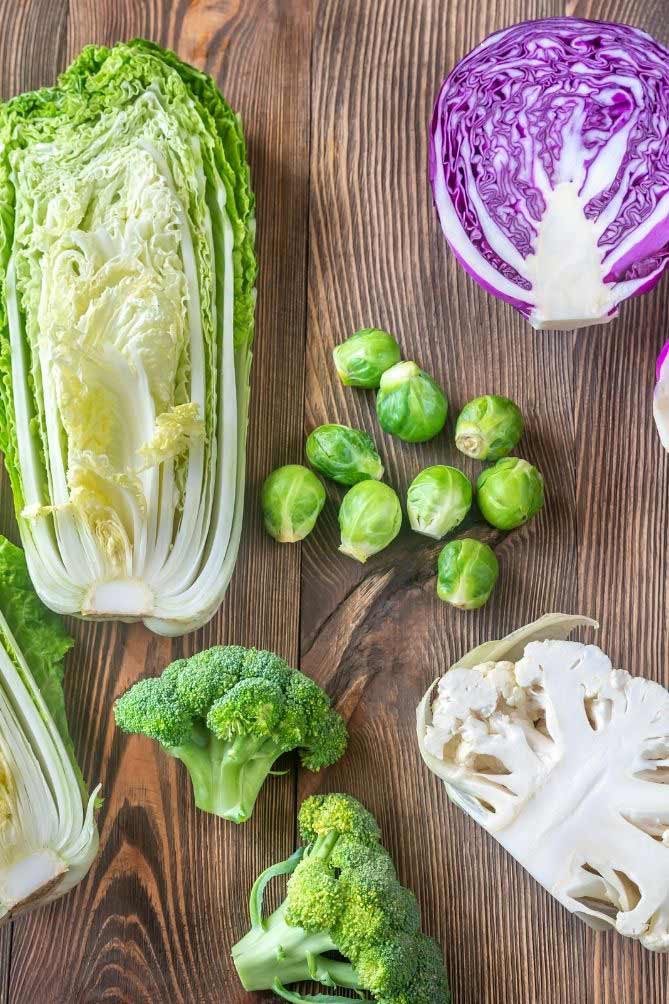
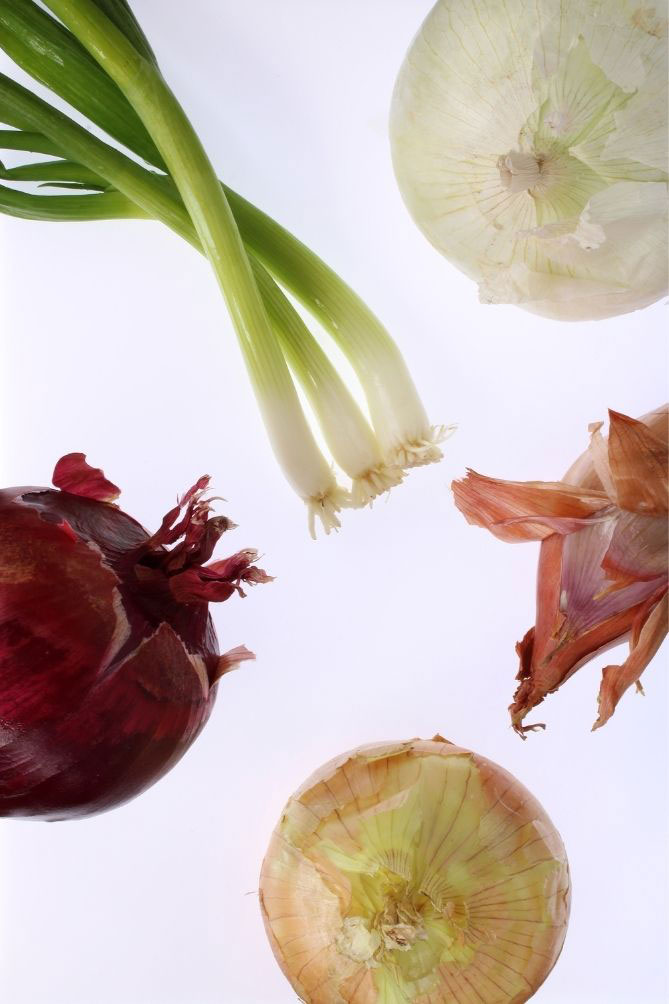
Cabbage—and asparagus, broccoli, Brussels sprouts, red cabbage, leeks, onion, radishes, turnip tops, and more—contain high levels of sulfur.
This is good. Your body needs that sulfur for many reasons.
Sulfur is the third most abundant element in your body and is present in amino acids found in your skin, hair, and nails where they help to make these tissues strong and flexible.
Your body needs sulfur to build and fix your DNA and protect your cells from damage that can lead to serious diseases such as cancers. Sulfur also assists your body to metabolize food and contributes to the health of your skin, tendons, and ligaments.
Hydrogen sulfide
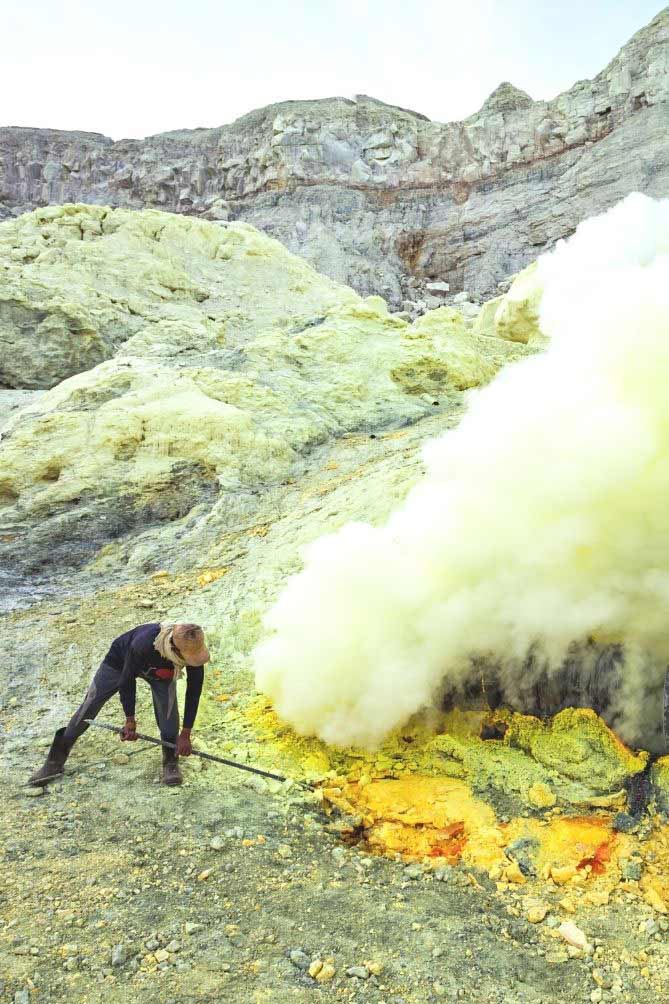
Hydrogen sulfide is a gas that forms during the fermentation process.
Hydrogen sulfide is a flammable, colorless gas with a characteristic odor of rotten eggs. It is commonly known as hydrosulfuric acid, sewer gas, and stink damp. People can smell it at low levels.
—PubChem
But, what does this have to do with my smelly sauerkraut?
Why does my fermenting sauerkraut smell so noxious?
I have to thank one of my dear readers for solving this puzzle—and offering a solution.
Depending upon the variety of cabbage and growing conditions, the amount of sulfur in any one head of cabbage can vary greatly which is why some of us have yet to have the pleasure of experiencing these lovely odors.
When sauerkraut is fermenting much of the sulfur converts to hydrogen sulfide which is why the kraut smells a little like dirty diapers when it’s fermenting. The hydrogen sulfide is volatile and blows off as soon as the kraut is exposed to air but, if too much is trapped in the kraut for too long it can convert to compounds called mercaptans which have an unpleasant smell and are not volatile.
As this hydrogen sulfide gas gets released from your jar of fermenting sauerkraut, you notice odors like a smelly fart. What fun!
Other Natural Fermentation Odors
Not all odors are caused by sulfur.
According to Kirsten and Christopher Shockey, authors of Fermented Vegetables – that I reviewed here, some of the stink periodically experienced in fermentation is caused by the production of naturally occurring fatty acids.
For reasons unknown, some batches produce one or more of these acids in quantities that affect the smell.
- Propionic acid is often described as smelling like human sweat or dirty socks or can also smell sulfurous like flatulence.
- Caproic acid smells like goats.
- Butyric acid smells like rancid butter.
- Isovaleric acid smells like a stinky locker room
Nasty fermentation smells will have any housemate banishing fermentation from happening in your home forever. Not what I want to see happen.
Just remind yourself of the numerous nutritional benefits they are packed with as your nose adjusts to the odors.
Rest assured, however, your sauerkraut is still safe to consume.
What to do when overpowered by smelly sauerkraut?
First off, you’ll need to identify what category the odor belongs to. Is it a noxious, pungent, or a “normal” fermentation odor?
- Noxious. Odor caused by the production of hydrogen sulfide gas or other naturally occurring fatty acids. Human sweat, dirty socks, flatulence, goats, rancid butter, stinky locker room, dirty diapers, rotten eggs, stinky Swiss cheese, sulfur, bleach, or ammonia?
- Pungent. Rotting or putrid food, or an unmistakably awful odor that might even make your eyes water.
- Normal. Sour, reminiscent of vinegar, fresh, tangy. Or, even yeasty, beer-like, or of alcohol if Kahm yeast has taken residence.
Noxious fermentation odors
If you jar of ferment smells noxious, this is what my reader, with a degree in fermentation science, recommends:
If a batch of kraut is particularly stinky during the initial fermentation go ahead and open your jar and mix or stir it to release the hydrogen sulfide gas. Maybe even leave the jar opened for a few hours, stirring it a few more times. Then, push the mixture back down into the jar, put your weight back in, recap the jar, and let your sauerkraut continue to ferment.
Pungent Odors
If your sauerkraut smells like rotting or putrid food, you’ll want to toss it. Putrid is an unmistakably awful odor that might even make your eyes water. Usually, molds, yeasts, or an off-color accompany truly putrid-smelling sauerkraut.
Normal fermentation odors
If your ferment smells, sour, reminiscent of vinegar, fresh, or tangy, all is good. It even might smell yeasty, beer-like, or of alcohol if Kahm yeast has taken residence.
- Compare odors with some store-bought sauerkraut. If you are totally new to sauerkraut and not sure how if what you smell is putrid or normal, buy a jar of sauerkraut to get a sense of what sauerkraut smells like. Look for raw, unpasteurized sauerkraut in the refrigerated section of a natural foods store. Compare its smell to what you have fermenting and nibble on it while you wait for your sauerkraut to ferment.
- Be patient. The strongest odors occur during the first few days when the various acids, are finding their way out of your jar. After that, odors will be less noticeable.
- Trap odors. Keep a dish of baking soda next to your fermenting sauerkraut where it will absorb some of the odors.
- Relocate. Move your ferment to another room in the house—or even the garage—where it is out of the way, or even ventilated.
- Use water-sealed lids. Invest in water-sealed fermentation lids or a water-sealed fermentation crock that tend to trap most of the offensive odors.
Frequently Asked Questions about Smelly Sauerkraut
Both allium vegetables (garlic, leeks, onions, scallions, and shallots) and cruciferous vegetables (broccoli, cauliflower, cabbage, arugula, kale, and radishes) are rich in sulfur and could cause overly noxious odors during fermentation.
Many of the vegetables we commonly ferment are high in sulfur. During fermentation, much of the sulfur converts to hydrogen sulfide, a noxious smelling gas.
As long as it doesn’t smell putrid, it is safe to eat. Odors described as dirty diapers? Rotten eggs? Stinky Swiss cheese? Sulfur? Bleach? Ammonia? and Gym sweat? are different and are caused by the sulfur in your ferment.
There you have it. Why a batch of sauerkraut may smell noxious and what to do about it.
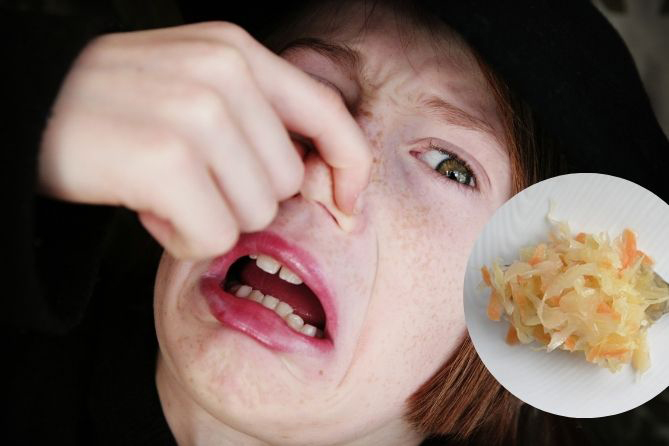

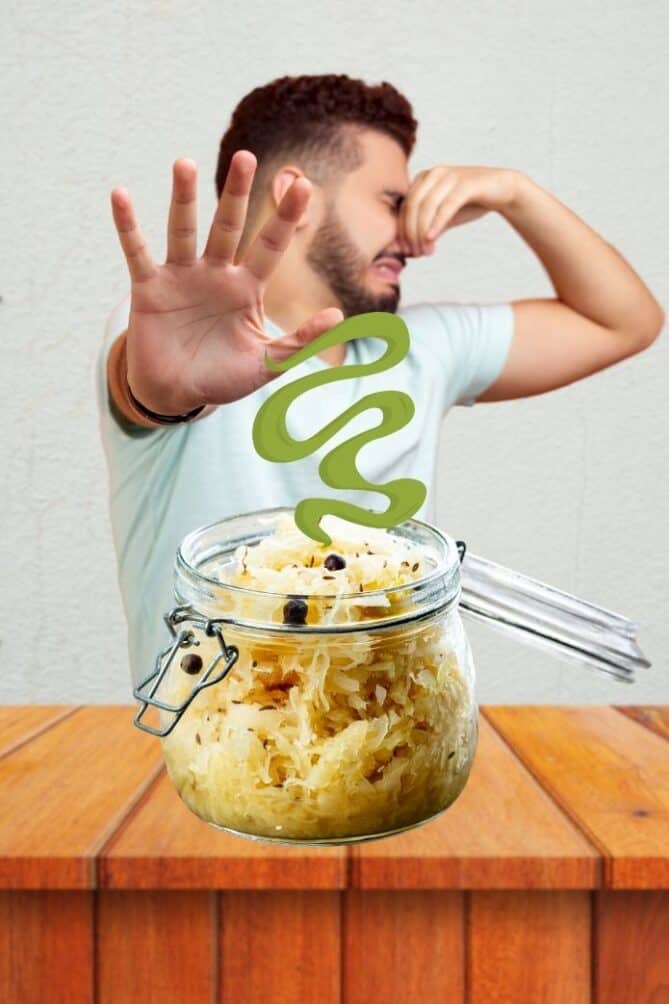

 This post may contain affiliate links which won’t change your price but will share some commission.
This post may contain affiliate links which won’t change your price but will share some commission.